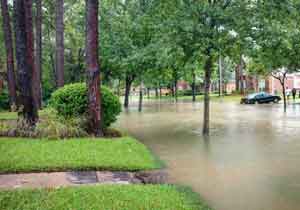3 Possible Reasons Gas Prices Spiked Following Hurricane Harvey

Hurricane Harvey officially dumped 20 inches of rain on Houston between Aug. 25 and 29, with some local areas receiving much more.1 By Aug. 31, more than 20 percent of U.S. oil-refining capacity had been knocked out.2 Adding to the disruption were two explosions at a chemical plant, port and pipeline closures and road-hauling delays in affected areas.3
Meanwhile, average retail gasoline prices nationwide increased 14 cents, or about 6 percent, in the immediate aftermath of the storm.4 The hurricane clearly disrupted a major gasoline-refining region, which could result in significantly reduced output for some time.
But why did retail gasoline prices rise so quickly across the nation? Shouldn’t the retail price have been unaffected until higher-priced gasoline supplies began to arrive in the days and weeks ahead?
Why Did Gas Prices Spike?
Three possible causes of the sudden increase in retail gas prices are:
- Widespread price gouging
- Higher oil prices, which are the primary determinant of gasoline prices
- Problems specific to gasoline production and distribution
As described below, the best explanation is probably the last: Higher prices at the pump across the country reflect Harvey’s impact on the gasoline-refining and -distribution sector.
Price Gouging
Price gouging is unlikely to be the best explanation for the nationwide increase in gas prices. First, for retailers to raise prices, all station owners in an area would have to coordinate their actions. Otherwise, each individual station would have an incentive to undercut rivals to gain market share, and this would keep prices close to costs. So, collusion to fix prices is hard to maintain in a market with many competitors.
Second, in addition to being hard to maintain, collusion to fix prices is illegal: The U.S. Department of Justice prosecutes collusive behavior in petroleum markets. The DOJ brought 23 criminal cases against price-fixing conspiracies in local gasoline and diesel fuel markets between 1970 and 2008, obtaining convictions of 22 individuals and 55 companies.5
Finally, consumers and the media are very aware of posted gas prices. Complaints of unfair pricing are easy to file in most states.6
Surge in Oil Prices
A second possibility is a surge in oil prices, which would drive up the cost of gasoline because oil is the major determinant of refined-product prices.
As we described in a previous article, publicly observed shocks to upstream costs (oil) quickly are reflected in downstream prices (gasoline) because competition forces retailers to converge quickly to the new equilibrium price.7
This oil-focused explanation is implausible, however. The price of oil declined 3.5 percent between Aug. 25 and Aug. 30.8 Indeed, in a reversal of the usual cause-effect chain, the damaged gasoline-producing sector may have pushed oil prices down somewhat as oil demand weakened temporarily.
Disruption to the Refining and Distribution System for Gasoline
The most likely explanation for the contemporaneous spike in retail gasoline prices as Hurricane Harvey battered Houston is the significant disruption to the gasoline-refining and -distribution system.
The wholesale price of gasoline increased 13 percent between Aug. 25, and Aug. 30.9 Traders quickly recognized that the supply of gasoline to nationwide retail markets would be reduced in the days and weeks ahead, causing drivers to bid up its price. As explained in our previous article, competitive downstream markets quickly absorb the price increases observed in the upstream market, even though the newly scarce physical product hasn’t had time to arrive in local markets.
In tomorrow’s blog post, we’ll break this down further using two hypothetical local gas stations to illustrate why these types of price increases should happen.
Notes and References
1 This is according to daily precipitation totals at Houston Airport. Some local areas received more than 50 inches of rain. See Samenow, Jason. “After Disastrous Rain Around Beaumont and Port Arthur, Harvey Surges Inland.” Washington Post, Aug. 30, 2017.
2 Sider, Alison. “Gasoline Prices Jump in Harvey’s Wake.” Wall Street Journal, Aug. 31, 2017.
3 See previously referenced article by Sider, and Matthews, Christopher M., and Sider, Alison. “Harvey Ripples Through U.S., Global Energy Markets.” Wall Street Journal, Aug. 30, 2017.
4 This estimate is from the Oil Price Information Service, as quoted in Sider’s article.
5 See the chapter on the U.S. in Organization for Economic Cooperation and Development, Competition in Road Fuel, 2013.
6 For example, Missouri residents may file an online complaint reporting an instance of what they believe to be price gouging.
7 Emmons, William R., and Neely, Christopher J. “Why Do Gasoline Prices React to Things That Have Not Happened?” Regional Economist, July 2007.
8 The futures contract price of one gallon of West Texas Intermediate for delivery on Sept. 20 was $47.65 at the close of trading on Aug. 25. This contract closed at $45.96 on Aug. 30, a decrease of 3.5 percent.
9 The futures contract price of one gallon of regular reformulated blendstock for oxygenate reblending for delivery on Aug. 31 was $1.6666 at the close of trading on Aug. 25. This contract closed at $1.8847 on Aug. 30, an increase of 13.1 percent since Aug. 25.
Additional Resources
- Regional Economist: Why Do Gasoline Prices React to Things That Have Not Happened?
- On the Economy: Economic Effects: Hurricane Harvey vs. Hurricanes Katrina and Rita
- On the Economy: Why Don’t Gas Prices Always Move in Sync with Oil Prices?
Citation
William R. Emmons and Christopher J. Neely, ldquo3 Possible Reasons Gas Prices Spiked Following Hurricane Harvey,rdquo St. Louis Fed On the Economy, Sept. 7, 2017.
This blog offers commentary, analysis and data from our economists and experts. Views expressed are not necessarily those of the St. Louis Fed or Federal Reserve System.
Email Us
All other blog-related questions



